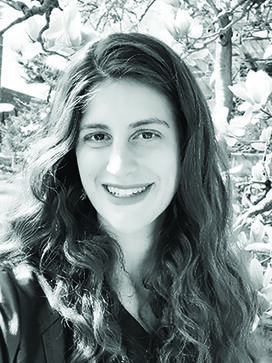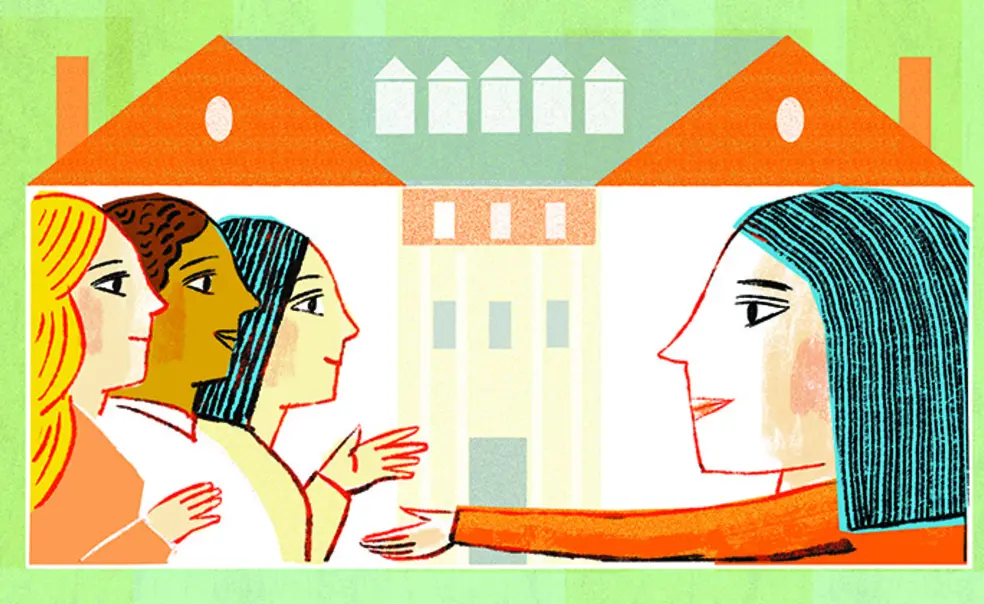Grad Student Is the ‘Cool Aunt’ to Undergrads
As a Resident Graduate Student at Forbes College, Emily Miller has insight into the lives of undergraduates

“We need to have fun now because your life is over at 25!”
This was a comment I, a 28-year-old, heard one rainy spring night as I sat around a table with freshmen. For the past four years, I have been one of the Resident Graduate Students (RGS) at Forbes College. Like the name suggests, a handful of grad students live in our own apartments, complete with kitchens and bathrooms, in the eight residential colleges. I typically describe my job as an RGS as being a “cool aunt.” I am always ready with snacks ranging from Girl Scout cookies to homemade beignets. I lend out vacuum cleaners, baking supplies, and books. I provide a window into millennial culture and what it was like to watch High School Musical on cable. I serve as proof that yes, you can bomb a midterm or two or not get that dream summer internship, and still graduate and be happy where you end up.
I graduated from Cornell University with a policy analysis and management degree. I worked for two years in the Washington, D.C. area on adolescent health, and now, as a Ph.D. student in the Program in Population Studies, I examine the transition to adulthood. I find adolescence and young adulthood to be an exciting time.
Princeton is a place where possibilities are theoretically limitless, but constrained by time, health, and other obligations. The most common heart-to-heart I have with undergrads is about how to navigate the mixed messages about what you “need to do” in college.
Most graduate students exclusively interact with undergraduates through precepting and maybe the occasional lab mentorship or an extracurricular club. Higher education is a puzzle, with everyone only understanding a couple of pieces. Being a preceptor and an RGS has allowed me to triangulate data. Often, I see two sides of Princeton — and the questions and opinions I had about student life are both illuminated and complicated by what I’ve observed in residential life.
For example, I struggled to pull excitement out of students at a precept that I thought was pretty late in the morning (10 a.m.) — until I learned how groups ranging from dance to sports frequently start at 11 p.m. and go to 3 or 4 a.m. I tried scheduling multiple office hours and being around before and after class to answer questions, but that did not stop a parade of requests to meet at alternate times. Then over dinner in the Forbes dining hall, students showed me their Google Calendars with nearly every 15-minute chunk blocked in, including FaceTime with parents or friends.
While preparing midterms, I would wonder why it took until the last minute to find out about accommodations for exams or to learn about a personal issue a student was facing after multiple precept absences. As an RGS, I see how the hold-ups happen in real time as students struggle with bureaucracy, wait times, and paperwork.
As a graduate student, I am trained to value discovery, creativity, and dreaming big, yet these traits were far from universally present in my classes. In Forbes, that passion flickers back to life. Students sparkle when they talk about their interests ranging from physics to gentrification, or their hobbies like fashion or board games. The longer I’ve been an RGS, the more I have realized that for many students the love of learning becomes increasingly buried under unrelenting exhaustion and expectations. I wish I could have precept over Forbes brunch.
Even though I didn’t graduate from my undergrad that long ago (2016), I feel like higher education in elite institutions has morphed dramatically. The world has, too — the Varsity Blues admissions scandal, COVID-19, increasing economic inequality in the United States and abroad, and the adolescent mental health crisis have all shaken our beliefs in what it means to attend an elite institution and successfully launch into young adulthood.
In response to such uncertainty, it appears we have responded with the idea that we need to do more and be more. Admission to elite institutions is a lifelong endeavor full of dedication in coursework and beyond, as well as luck. That messaging about rigor does not stop once students arrive — it accelerates. Princeton is a place where possibilities are theoretically limitless, but constrained by time, health, and other obligations. The most common heart-to-heart I have with undergrads is about how to navigate the mixed messages about what you “need to do” in college.
Being an RGS has allowed me a unique chance to observe, inside and outside the classroom, and empathize about what it means to be a Princeton student, but more importantly a person, in today’s world.












2 Responses
Rocky Semmes ’79
2 Years AgoConcern About the Impact of Busy Student Schedules
There is a fine line between rigor and repression, and recent reporting resoundingly reinforces that this relative collegiate Rubicon is now concerningly crossed. Resident Graduate Student Emily Miller, writing in PAW, cites undergraduates whose extracurricular activities (“dance to sports”) frequently start at 11 p.m. and go to 3 or 4 a.m. (On the Campus, May issue). Ms. Miller then adds that these same Forbes College undergrads showed her “... their Google Calendars with nearly every 15-minute chunk blocked in, including FaceTime with parents or friends.” These are not exceptionally encouraging observations.
In light of that article, the good news/bad news story of that same PAW issue is the reporting that University Health Services (UHS) is building a new home that will include expanded “counseling and psychological services” (On the Campus, May issue). Apparently, this development is not a moment too soon. Ms. Miller’s reporting raises alarms for the mental health of the entire undergraduate body, and leads one to question University leadership in this regard.
Oona Miller Hanson ’97
2 Years AgoThe University Would Be Well Served By Consulting with RGS
Emily Miller’s essay about the role of Resident Graduate Students struck a chord with me (On the Campus, May issue). It’s clear she and other Resident Graduate Students have their finger on the pulse of today’s undergraduate life in a way most professors and administrators never could. If those making policy decisions for students aren’t already consulting with Resident Graduate Students, I hope they start inviting them to the table (and compensating them for their time!) as the University assesses academic policies and examines the larger campus culture.